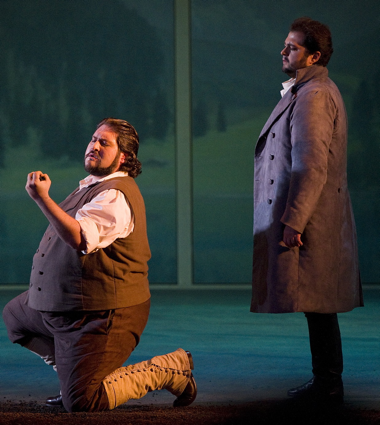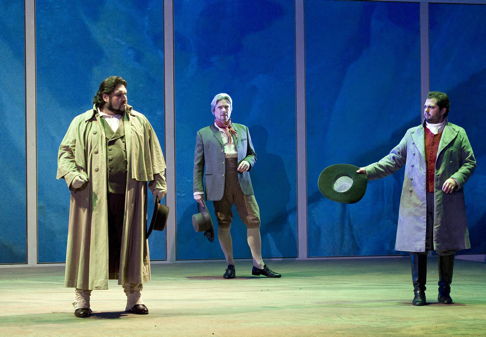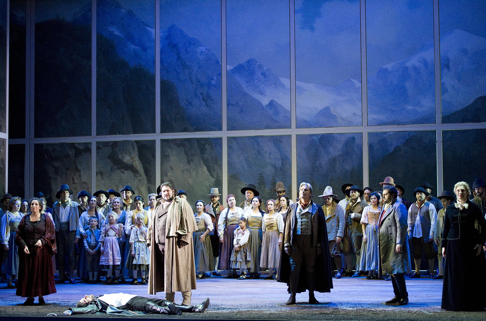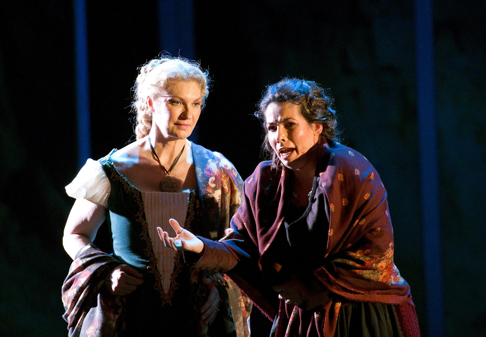
27 Jan 2015
Guillaume Tell in Monaco
Peasants revolt in a sea of Maserati and Ferrari’s.
English Touring Opera are delighted to announce a season of lyric monodramas to tour nationally from October to December. The season features music for solo singer and piano by Argento, Britten, Tippett and Shostakovich with a bold and inventive approach to making opera during social distancing.
This tenth of ten Live from London concerts was in fact a recorded live performance from California. It was no less enjoyable for that, and it was also uplifting to learn that this wasn’t in fact the ‘last’ LfL event that we will be able to enjoy, courtesy of VOCES8 and their fellow vocal ensembles (more below …).
Ever since Wigmore Hall announced their superb series of autumn concerts, all streamed live and available free of charge, I’d been looking forward to this song recital by Ian Bostridge and Imogen Cooper.
The Sixteen continues its exploration of Henry Purcell’s Welcome Songs for Charles II. As with Robert King’s pioneering Purcell series begun over thirty years ago for Hyperion, Harry Christophers is recording two Welcome Songs per disc.
Although Stile Antico’s programme article for their Live from London recital introduced their selection from the many treasures of the English Renaissance in the context of the theological debates and upheavals of the Tudor and Elizabethan years, their performance was more evocative of private chamber music than of public liturgy.
In February this year, Albanian soprano Ermonela Jaho made a highly lauded debut recital at Wigmore Hall - a concert which both celebrated Opera Rara’s 50th anniversary and honoured the career of the Italian soprano Rosina Storchio (1872-1945), the star of verismo who created the title roles in Leoncavallo’s La bohème and Zazà, Mascagni’s Lodoletta and Puccini’s Madama Butterfly.
Evidently, face masks don’t stifle appreciative “Bravo!”s. And, reducing audience numbers doesn’t lower the volume of such acclamations. For, the audience at Wigmore Hall gave soprano Elizabeth Llewellyn and pianist Simon Lepper a greatly deserved warm reception and hearty response following this lunchtime recital of late-Romantic song.
Collapsology. Or, perhaps we should use the French word ‘Collapsologie’ because this is a transdisciplinary idea pretty much advocated by a series of French theorists - and apparently, mostly French theorists. It in essence focuses on the imminent collapse of modern society and all its layers - a series of escalating crises on a global scale: environmental, economic, geopolitical, governmental; the list is extensive.
For this week’s Live from London vocal recital we moved from the home of VOCES8, St Anne and St Agnes in the City of London, to Kings Place, where The Sixteen - who have been associate artists at the venue for some time - presented a programme of music and words bound together by the theme of ‘reflection’.
'Such is your divine Disposation that both you excellently understand, and royally entertaine the Exercise of Musicke.’
Amongst an avalanche of new Mahler recordings appearing at the moment (Das Lied von der Erde seems to be the most favoured, with three) this 1991 Mahler Second from the 2nd Kassel MahlerFest is one of the more interesting releases.
‘And there was war in heaven: Michael and his angels fought against the dragon; and the dragon fought and his angels, And prevailed not; neither was their place found any more in heaven … that old serpent … Satan, which deceiveth the whole world: he was cast out into the earth, and his angels were cast out with him.’
If there is one myth, it seems believed by some people today, that probably needs shattering it is that post-war recordings or performances of Wagner operas were always of exceptional quality. This 1949 Hamburg Tristan und Isolde is one of those recordings - though quite who is to blame for its many problems takes quite some unearthing.
There was never any doubt that the fifth of the twelve Met Stars Live in Concert broadcasts was going to be a palpably intense and vivid event, as well as a musically stunning and theatrically enervating experience.
‘Love’ was the theme for this Live from London performance by Apollo5. Given the complexity and diversity of that human emotion, and Apollo5’s reputation for versatility and diverse repertoire, ranging from Renaissance choral music to jazz, from contemporary classical works to popular song, it was no surprise that their programme spanned 500 years and several musical styles.
The Academy of St Martin in the Fields have titled their autumn series of eight concerts - which are taking place at 5pm and 7.30pm on two Saturdays each month at their home venue in Trafalgar Square, and being filmed for streaming the following Thursday - ‘re:connect’.
The London Symphony Orchestra opened their Autumn 2020 season with a homage to Oliver Knussen, who died at the age of 66 in July 2018. The programme traced a national musical lineage through the twentieth century, from Britten to Knussen, on to Mark-Anthony Turnage, and entwining the LSO and Rattle too.
With the Live from London digital vocal festival entering the second half of the series, the festival’s host, VOCES8, returned to their home at St Annes and St Agnes in the City of London to present a sequence of ‘Choral Dances’ - vocal music inspired by dance, embracing diverse genres from the Renaissance madrigal to swing jazz.
Just a few unison string wriggles from the opening of Mozart’s overture to Le nozze di Figaro are enough to make any opera-lover perch on the edge of their seat, in excited anticipation of the drama in music to come, so there could be no other curtain-raiser for this Gala Concert at the Royal Opera House, the latest instalment from ‘their House’ to ‘our houses’.
"Before the ending of the day, creator of all things, we pray that, with your accustomed mercy, you may watch over us."

Peasants revolt in a sea of Maserati and Ferrari’s.
There was the usual automotive hardware in front of Monte-Carlo’s magical opera house. The peasants were all on the stage of the Salle Garnier, an embarrassment of riches, most notably Nicola Alaimo as Guillaume Tell and Celso Abelo as the lovesick Arnoldo. In fact the entire cast beginning with Mekeldi Atxalandabso as Reudi whose hymn to Swizerland “Accour dans ma nacelle” that opens the opera upheld the high level of singing that defined the evening, Basque tenor Atxalandabaso’s warm and easy high “c”’s only the first of the many vocal pleasures of the evening.
Music director of the Orchestre Philharmonique de Monte-Carlo Gianluca Gelmetti presided over his orchestra for this occasion, an opera he conducted twenty-years ago (1995) at the Rossini Opera Festival in Pesaro to enormous critical acclaim. Much has transpired in his career since 1995. He is now famous for the Italian post-Romantic repertory perhaps explaining the massive sonic scope he found in the Rossini score for the Salle Garnier, and the warmth of tone he infused into the orchestral sound firmly persuading us that Guillaume Tell was a new, sentimental Rossini, and a unique Rossini — it is the last of the Rossini operatic oeuvres.
Before all else Rossini’s Guillaume Tell is French grand opéra as its extended dramatic recitatives attest, though Rossini could not keep himself from breaking into some coloratura from time to time, a lapse effortlessly and beautifully absorbed into the musical flow by the maestro. Rossini discovered the pleasures of the rich French low mezzo-soprano voice in Hedwedge, the wife of Guillaume, dissolving this voice into a sublime trio with Guillaume’s soprano son, Jemmy and Mathilde, his savior, with its intricacies rendered by the maestro in rich delicacy. Though Gelmetti had already pummeled us with the fiery Rossini we know so well when Guillaume and Walter Furst shamed Arnold into fighting for his fatherland.
 Nicola Alaimo as Guillaume Tell, Nicholas Cavallier as Walter Furst, Celso Abelo as Arnold.
Nicola Alaimo as Guillaume Tell, Nicholas Cavallier as Walter Furst, Celso Abelo as Arnold.
There was the spectacle of typical grand opéra, the maestro endowing the classic Rossini storm with truly terrifying proportions (even though it was the same storm we know from the Roman comedies). And there were the magnificent complexities of the Rossini ensembles we know from the later Naples tragedies, the defiance of the peasants to the strength of the Hapsburgs magnified by Gelmetti in the repeating brass motifs in the orchestra, each time louder until it could not become louder. But it did, shattering the acoustic of the Salle Garnier.
At last Rossini resolved the opera’s conflicts into a huge, uncharacteristically pastoral ensemble evoking the beautiful cello elegy of the overture with its singing oboe echoed by flute — the majestic serenity of the Alps’ mountain valleys restored. But only for a short while, the peasants finally rushed forward shouting “liberté, liberté!” as loud as they possibly could.
One could not help recalling that it was in 1910 when the Monegasque Revolution forced the prince of Monaco, until then an absolute ruler, to proclaim a constitution.
What we missed in Monaco were the ballets, an economy that saved us one and one half hours of time, compacting the above musical riches of the opera into a brief three hours twenty minutes. Other less obvious economies took their toll as well, rendering the storytelling sometimes oblique and other times incomprehensible. The adage that the full ballets are integral to the dramatic integrity of Guillaume Tell was again proven in Monaco.
 Décors by Eric Chevalier, Costumes by Françoise Raybaud
Décors by Eric Chevalier, Costumes by Françoise Raybaud
Monaco-born Jean-Louis Grinda, the metteur en scène (and general director of Opéra Monte-Carlo) knows that the complex musico-dramatic structures of the Rossini tragedies resonate in abstract formulae, either conceptual (like the museum dioramas of the 2013 Pesaro production) or in the physical architecture of the set itself. In this new production Grinda’s designer, Eric Chevalier, evokes the Helvetic mountainous setting in hazy images projected onto an imprisoning box structure of small repeating panels that open and close, the back wall of which disappeared into the brilliant dawn-of-freedom light. Costumer Françoise Raybaud provided threatening teutonic patterns of the late nineteenth century for the Hapsburg characters.
Movement for the chorus action was in purely geometric terms — lines and circles. Images were few, simple and powerful. Guillaume Tell himself pulled a plow, like a beast, across the stage during the opening chorus (a shocking and confusing image), there were two dance pantomime sequences in which a ballerina and a ballerino were attached to one another in a kiss (like two animals stuck together in the mating act — another shocking and confusing image) — choreography by Eugénie Andrin. Arias and duets were delivered standing front and center, as in concert format. Grinda provided a basic context and basic movements for the opera, but did little to illuminate the story evidently relying on the genius of Rossini and the brilliance of the performances to fire the evening.
And that they did.
Italian baritone Nicola Alaimo is a gigantic figure, appropriate to a mythic hero of William Tell proportion. His voice and presence are warm, powerful and encompassing, in short he is a convincing Guillaume Tell. His antagonist Gessler, the Hapsburg governor, was sung by French bass Nicholas Courjal in threatening, black toned vocal color, with a vividly present figure. Spanish tenor Celso Abelo as the fickle tenor Arnold had high “c”’s to spare, squarely hit and held rather then finding place in the musical flow. Just when you thought no human could have the stamina to hit another, he hit the final one of his showpiece aria and held it forever. Mr. Abelo is an accomplished Rossini performer.
 Annick Massis as Mathilde, Élodie Méchain as Hedwidge
Annick Massis as Mathilde, Élodie Méchain as Hedwidge
French soprano Annick Massis was Mathilde, a role that only sometimes requires the Isabella Colbran dramatic coloratura model of Rossini tragedies. Mlle. Massis indeed well held the stage as Hapsburg aristocracy, riding crop in hand, though her showpiece arias were powerful her coloratura was not convincing and her high notes were of a spread tone that defied identifying any one individual note. French contralto Elodie Méchain sang Guillaume Tell’s wife Hedwidge to absolute perfection, and Russian soprano Julia Novakova as his son Jemmy provided the appropriate upper edge to the ensemble textures.
The only disappointment of the evening was the staging (lack of) for the arrow and apple.
Michael Milenski
Casts and production information:
Guillaume Tell: Nicola Alaimo; Hedwige: Elodie Méchain; Jemmy: Julia Novikova; Arnold: Celso Albelo; Melchtal: Patrick Bolleire; Walter Furst: Nicolas Cavallier; Gessler: Nicolas Courjal; Mathilde: Annick Massis; Rodolphe: Alain Gabriel; Leuthold: Philippe Ermelier; Reudi; Mikeldi Atxalandabaso. Chorus of the Opéra de Monte-Carlo. Orchestre Philharmonique de Monte-Carlo. Direction musicale: Gianluigi Gelmetti; Mise en scène: Jean-Louis Grinda; Décors: Éric Chevalier; Costumes: Françoise Raybaud; Lumières: Laurent Castaingt; Chorégraphie: Eugénie Andrin. Salle Garnier, Monte-Carlo, January 25, 2015.